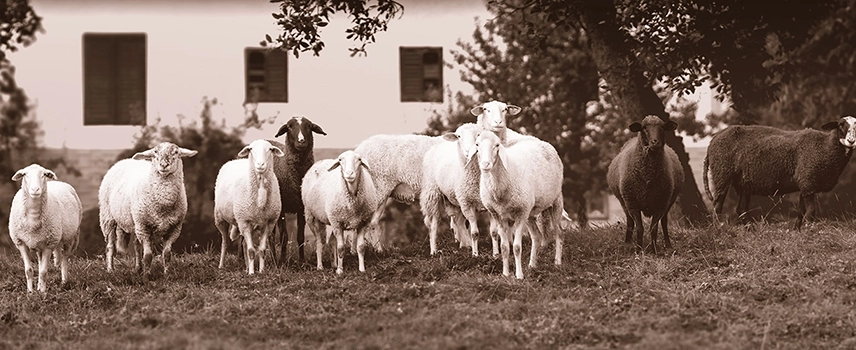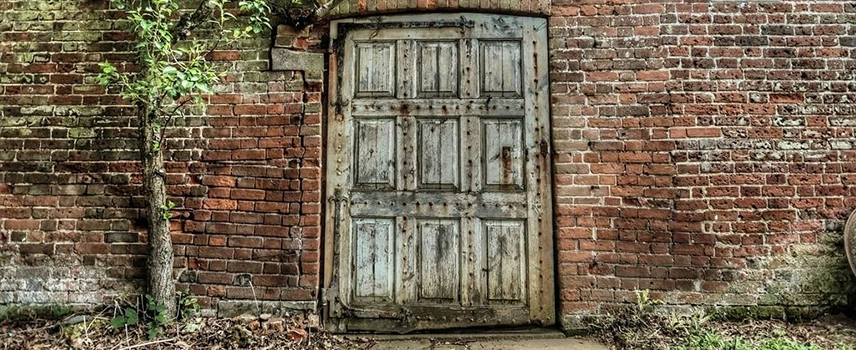Rural Crime Prevention
“Rural crime is very different from crime faced in urban areas - what are the main influences?”
by Virginie Roux | 5th Nov 2020

Life in the countryside, away from the hustle and bustle of the city often relates quite rightly to a peaceful, simple, and quiet existence, close to nature. Sadly, this does not mean that crime is totally absent from the countryside, pasture lands and country residences can also be the unfortunate victims of crimes.
UK National Rural Crime Survey
Rural Crime is exponentially on the rise here in the UK and technics used by criminals are increasingly becoming more and more sophisticated, costing £54.3m in 2019 alone, according to NFU Mutual.
Targets come from different backgrounds whether they are farmers, estate owners or homeowners, the loss endured is always substantial, especially when their livelihood is at stake.
The theft of agricultural vehicles has sharply increased by nearly 25% in comparison to the previous year.
In the UK, the counties which are the most affected by rural crimes are the counties of Lincolnshire, Essex and North Yorkshire, costing them respectively over £2 million in 2019.
What is Rural Crime?
Rural crimes are any crimes that occur in the countryside or in a rural environment including offences that are specific to agriculture and the countryside, as well as general crimes which affect rural communities such as damage to property, theft and violence.
Rural Crime vs Urban Crime
Obviously, as cities are more populated than rural villages, crimes tend to be higher in an urban environment than in the countryside.
For instance, when it comes to robbery and domestic burglary, urban areas are subject to higher crime rates. According to a survey conducted by the Office of National Statistics, between 2019 and 2020, there were 0.2 robbery offences in rural places per 1000 population, whereas in urban areas with major conurbations, there were 2.7 robbery offences per 1000 population. Regarding domestic burglary cases, there were 4.7 offences per 1000 population in rural areas. Conversely, in urban areas with minor conurbations, there were 15.7 offences per 1000 population.
Types of Rural Crime
There are certain types of crimes that are specific to rural areas which do not take place in a city including:
Agricultural crimesAgricultural crimes are crimes that occur in farms, which can involve theft of equipment and vehicles including quads and All-Terrain Vehicles, theft of livestock and metal, vandalism to property or machinery and livestock worrying by dogs on agricultural land.
Equine crimesEquine crimes are crimes that affect working stables and equestrian centres involving the theft of horses, tack equipment (saddles, bridles, and rugs), and horse boxes.
With a surge of horse mutilation cases in France recently, horse-ripping is another type of crimes committed against horses. Authorities suspect these cases could be related to an internet challenge on the dark web or to a cult.
Rural Fly-tippingRural fly-tipping is the illegal disposal of waste on either public or private land with two-thirds of farmers being affected by this scourge according to a survey conducted by Farmers Weekly. Clearing a land from waste is the responsibility of the landowner which can have a massive cost implication. It can also cause land contamination and be detrimental as a result for the health of livestock, wildlife and humans.
Wildlife crimesWildlife crimes are criminal actions that affect the wildlife that is protected by legislations against poaching of wild animals, persecution of wild animals (badgers, bats, birds of prey, …), egg theft, hare coursing, collection of protected plants and trade of protected species, animal products (ivory, rhino horns, etc.).
Heritage crimeHeritage crimes are criminal actions that harm heritage assets including arson, theft of metal, historical or culture artefacts, anti-social behaviour, arson, graffiti, and unauthorised metal detecting, more commonly known as “nightawking” in Great Britain.
“Nightawking” is mostly conducted at night (hence the name) on farmlands or archaeological sites without the permission from the landowner or the English Heritage, using a metal detector in the view to find historical artefacts of significant value (broaches and coins etc.) so they can be sold on the blackmarket and on auction sites. Nightawking particularly affects the British counties of Yorkshire, Essex, Kent, Lincolnshire, Norfolk, Cambridgeshire and Suffolk that have a rich Anglo-Saxon heritage or large areas of arable lands. Not only does nightawking causes damage to farmlands but it takes away valuable pieces of history that will be lost forever.
Farm trespassPrivate farmland is often illegally accessed by intruders in different scenarios, which is classed as trespass, a civil offence under UK law. Illegal encampment is a form of trespassing and is the illegal occupation of private land without the authorisation of the landowner. Unfortunately, farmers often fall victims of illegal encampment with travellers occupying their land without permission, which hinders farmers from making a living out of their land and often involve having to dispose rubbish at their own cost. Illegal encampment is a very sensitive issue, being considered a private matter not requiring police assistance, meaning that for occupiers to be evicted, landowners often have no other choice but to seek legal assistance. It took for instance 10 years in a legal battle for the landowner of Dale Farm to evict 1000 travellers from his land.
Further to this, criminal damage is often caused by trespassers to gain illegal access to a farm land so they can let their horse graze on the land without the consent of the landowner; a practice that is called fly-grazing, which is problematic as landowners become automatically responsible for the horse’s welfare, having to pay for veterinary treatments, food and water supply, as well as fencing.
Animal rights activism is another issue that can affect farming with activists accessing farmlands to do demonstrations. Although in the best case scenario, activists don’t commit any criminal offence, in other cases they can cause a great level of distress, intimidating land owners when they are carrying out their work, causing aggravated trespass or breaching peace, when eventual harm is caused to the land owner or his property.

Stately homes are large ancestral properties in the countryside with extensive parklands and glorious gardens. Country homes usually hold outstanding collections of antiques and artefacts of precious value that adorn multitude of rooms, often having been part of the estate for centuries.
However, boasting opulence, country estates can attract the wrong kind of attention and have been targeted in the past by highly organised gangs. Britain’s biggest rural estate burglary is valued at over £80m worth of property.
Country estates are often open to the public, proposing engaging tours and events, but it can also be an opportunity for criminals to do a reconnaissance to plan a burglary! As a common modus operandi that has proved to be successful, burglars often keep country houses they intend to rob under close surveillance for weeks, enabling them to conduct a raid on a house even if homeowners are at home, as they use savvy methods to remain undetected or technics to dissimulate their identity using for instance face masks, balaclavas and stolen cars.
Due to the property size of most stately homes, it can be quite challenging and hefty to secure sites of this scale. Home invasion can easily get unnoticed without the right security set up due to the remoteness of a rural property, being out of view of neighbours or by-passers who could alarm homeowners about intruders or unusual activity.
Rural Crime prevention tips
To prevent rural crimes from happening, there are various methods that landowners and homeowners can implement to limit the risk and probability of rural crimes including equipment to discourage and detect intruders.
1. Rural Crime Deterrence methodsLeaving a land or property unattended can be tempting for malevolent by-passers to commit a crime as nobody is present on site to witness their crime and report it to the police. The gain can justify taking the risk that is less likely if the site is unsecure.
Considering this, rural property owners are advised keeping their property well-maintained and invest in security systems that will make any criminal attempts more difficult, as an effective way to dissuade opportunistic thieves. Installing automatic security lights that switch themselves on at night and turn themselves off at dawn, supplemented by warning signs indicating that the property is alarmed and monitored by CCTV act as good deterrent tools.
2. Rural Crime Detection methodsFor a chance to pursue criminals who have committed crimes on rural properties, property owners must invest in security equipment to detect wrongdoing, enabling them to report a crime and provide evidence to the police so they can recover stolen property and arrest criminals.
To detect abnormal activities on your property or catch criminals red-handed, consider installing a CCTV system to watch over the parts of the property that are the most at risk and a monitored burglar alarm that alerts you when an intruder has entered your property.
It should be noted that police response times in the countryside can vary a great deal. So even if a crime is detected and taking place, in a remote location the police response may be post incident. As a result of this, technical security is best backed-up by physical security teams who can respond fast and detain criminals until police response arrives.
3. Rural Crime Access Prevention methodsProperty boundaries need to be secured and maintained to prevent illegal access, achieved by having a single gated entrance and defining clear property perimeters with the installation of field gate hinges and locking posts, as well as the use of natural boundaries such as hedges and deep diches to restrict vehicle access.
At Intelligent Protection International Limited, we provide estate security services to some large estates in the UK and abroad. We offer our clients technical and physical security solutions that are based on a Security Risk Assessment to meet the specific needs of the estate. This layered approach is particularly beneficial to large properties.
As country estates are often remote and cover a large territory, security equipment is supplemented by one of our residential security team who control access to the property, patrol the perimeter and ensure first response should someone manage to enter illegally the premises. Our residential security officers also often work alongside security dogs who not only dissuade potential intruders to enter illegally a country house property but would detect any unusual noise or smell and help their handler to apprehend a trespasser.
If you are concerned about the security of your rural home, Intelligent Protection International Limited can assist you. Contact Intelligent Protection International Limited to discuss any specific requirement you may have.